By Girija Madhavan
Diplomats, who witness a historical event with international ramifications in the country of posting, are very lucky. In 1989 my husband, A. Madhavan and I, saw the Fall of the Berlin Wall (9 November 1989), a potent symbol of the Cold War. The event changed relations between the States of Europe, their geographical boundaries and political affiliations. In 1990, the Federal Republic Germany (FRG) was reunified with the German Democratic Republic (GDR); the divided country became one.
After World War II, Germany was divided into four occupation zones administered by the victorious Allies. The US, Britain and France combined their zones to create FRG. The area controlled by the USSR became the GDR, a communist government with harsh rules overseen by the Stasi Police.
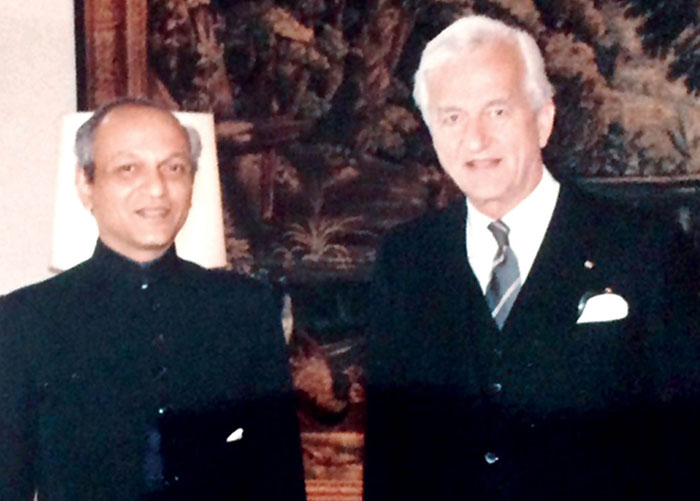
The Berlin Wall [Berliner Mauer] was built by GDR in 1961 to prevent East Berliners fleeing its regime. Made of barbed wire and concrete, with watch towers for armed sentries, it encircled the city of West Berlin and cut it off from GDR territory. Along the Wall, a no-man’s land existed between East and West Berlin. East Berliners were killed trying to cross that strip of land. Poignant, flower-decked memorials marked the “Unbekannt”, the tragic “Unknown”, who fell in a flight to freedom. A very few succeeded, using bizarre means like a balloon or hidden in the boots of cars.
On 11 May 1988, when Madhavan presented his Credentials as Indian Ambassador to President Richard von Weizsackerin Bonn, [then the capital of FRG], the Wall was still a forbidding presence. Diplomats entering GDR had to go through the entry point, “Checkpoint Charlie”.
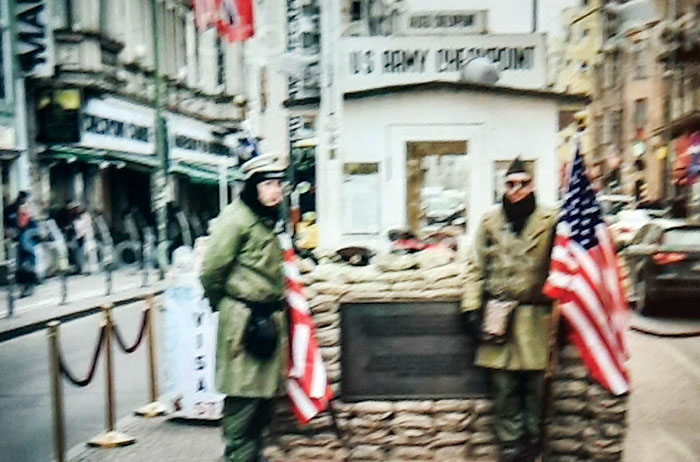
By 1989, Perestroika and Glasnost had been initiated by Gorbachev in the Soviet Union and there was pressure from East Europe to ease restrictions. The diplomatic corps of Bonn was intrigued by hints given by the US Ambassador Vernon Walters in a TV interview that a big surprise was due soon. Ambassador Walters was a remarkable personality, unconventional, but with a sharply honed political acumen. We were invited to one of his receptions. Instead of having high end caterers, he had arranged for popular eateries like McDonald’s to set up little booths in his garden, serving hamburgers but also gourmet spinach and cheese “quiche”! His prophesy about the GDR was soon realised when, in an unexpected move, GDR announced that their citizens could cross the borders without restrictions. In euphoria, rapturous crowds pulled down the Wall.
Among my papers, I recently found some Hotel Berlin letter paper on which I had made notes while on a visit to GDR in mid-March 1990. The memories flooded back of those days. I could recall East Berliners chugging along in the slow right lane of the Autobahns in their Trabant cars. “Trabbies” became symbolic of the brave, hardy East Berliner. The little children in the cars stared wonderingly as people thundering by in fast cars, blew kisses to them. The homeward bound Trabbies were loaded with luxuries from the West; “Two-in-one” tape recorders, toys, pot plants [red and green Poinsettias a favourite], bananas and canned pineapple. The visitors soon found that generic stores like Aldi, offered the cheapest and best deals and cleared the shelves there.

At the Wall, pieces of its surface were being removed to the sound of hammer and chisel; stacked neatly according to size and colour. The western façade of the Wall was covered with bright graffiti and bits of it priced according to colour and design. An eleven-year-old Turkish girl, eating a large sandwich, beckoned to us while her mother, head covered in a scarf, watched proudly. They were from Kreuzberg, an area of the city where a big Turkish community lived. She sold us three colourful pieces of the Wall for 10 DM each. Other souvenirs were T-shirts emblazoned with “9 November, Ich war dabei” [I was there].
When the Stasi Police was disbanded, people wondered about the future of their canine force. Over twenty German Shepherds, said to be attack dogs, had patrolled the no-man’s land between FRG and GDR with their handlers. Now the dogs were unemployed. Would they be put to sleep? However, younger dogs were reassigned to other work, older dogs rehabilitated with families.
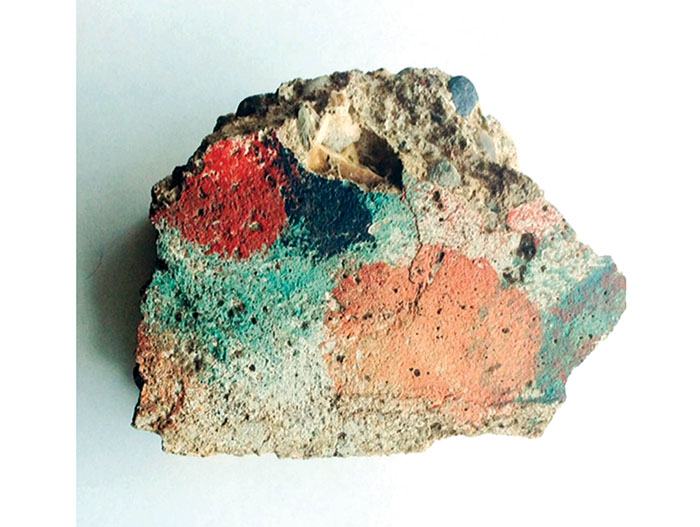
The question of the capital came up; was Bonn to remain the capital or should it be Berlin? Our friends in the German Foreign Office who wished to continue in Bonn held “Laugh or Cry” parties on the eve of the announcement; many cried. Our own Embassy also had problems of disposing of property in Bonn and acquiring new buildings in Berlin.
Madhavan was India’s Ambassador to FRG, while another IFS Officer represented India in the GDR. A piquant situation arose when GDR, after merging with FRG, ceased to be a separate country; the Indian Ambassador there had to be transferred elsewhere!
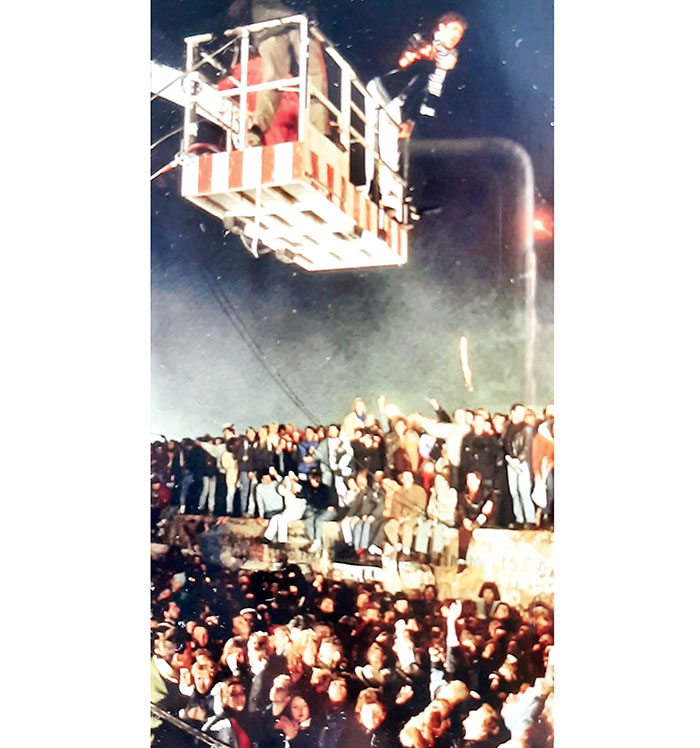
Memories of the Wall are linked with David Hazelhoff, star of TV serials like “Knight Rider” and “Baywatch”, whose reruns we still see on Indian television. David Hazelhoff is a good singer as well. A fan from Austria who had won a ticket to have lunch with him made him realise his potential in Europe. He was invited by the Germans to sing for a New Year’s Eve concert but made it a condition that it should be outdoors, where the Wall had been. So on 31st December 1989, in a bucket crane above the crowds below, he sang the song “Looking for Freedom” to the cheers of his fans. Based on an older German favourite, it cemented his magnetic approach to young Germans.
The Cold War ended with the historic Fall of the Wall, bringing relief from the oppressive menace of the Cold War; peace, a new and burgeoning optimism, individual freedoms and prosperity. Now a possibility of the encircling icy tentacles of a new Cold War looms. Everyone hopes for a thaw.



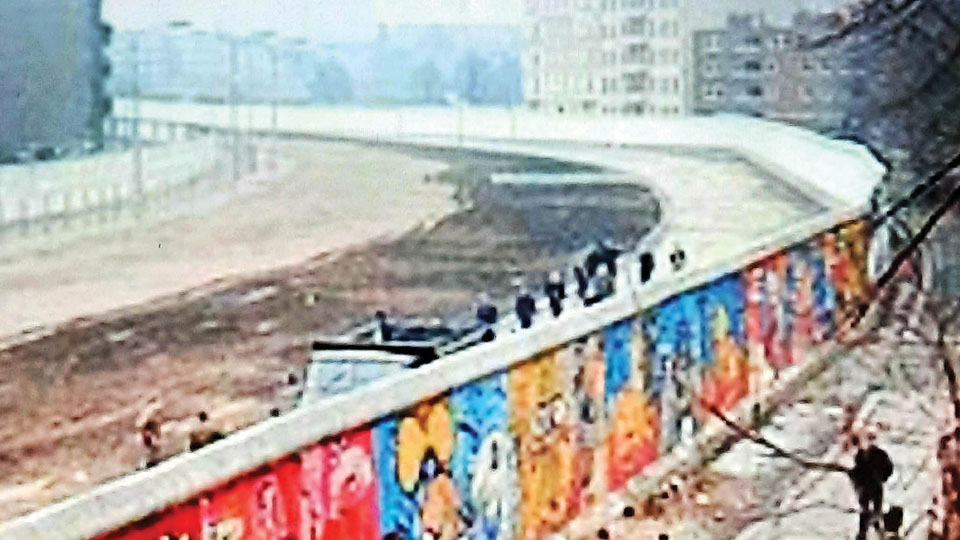




As usual, this author’s assessment of the reasons for the fall of the Berlin wall is blinkered.
This Girija Madhavan in a way similar to Javeed Nayeem has the propensity to self-publicity, and she picked this issue to present the photograph of her husband as the Indian ambassador to FRG. No mention of the Indian ambassador to the GDR, which India had recognised as an independent country, thanks to the close friendship of the USSR leaders. India was strongly in favour of GDR remaining as it was., despite the fact that it was receiving aid from the FRG. Socialism was the reason!!
The reason why Gorbachev let go of GDR was not because of Perestroika and Glasnost, but the realisation that that the GDR was maintained by with massive funding support from the USSR, which it could no longer afford. A few years later , countries such as Poland, Czechoslovakia, Hungary etc.. which were in the USSR, also became independent for the same economic reason.
I had been to to the West and East Berlins in mid-1980s, and was told that Wall would be no more in a few years. That happened!
Gorbachev also realised that the Cold War which the Berlin wall quantified was not worth continuing. When Gorbachev visited the unified Germany which marked 25 years of the fall of the Wall, he walked with the then Chancellor of Germany, Angela Merkel, who was a high official in the GDR, along the Wall divide, and summarised that the concept of the Wall was outdated by 1989- 27 years after the Wall came up. He got as he expected , and was promised, massive donation ( billions of DM) then the world’s strongest currency) from the FRG, by agreeing to the re-unification of Germany
David Hassselhoff ‘s Knight Rider was cancelled, he was bored and when an Austrian girl contacted him, he saw a break from his melancholy and boredom , and the 1989 feall of Berlin Wall was a lucky chance for him See: https://www.npr.org/2019/11/08/777155039/david-hasselhoff-is-still-big-in-germany-30-years-after-his-berlin-wall-show.
Those who really want to know how the Berlin Wall, its existence, its significance and its demise were influential in world politics, please read these novels by Len Deighton: https://www.goodreads.com/series/65594-bernard-samson
The fall of the Berlin Wall, and its reason for removal are all well recorded. Also, is well known how David Hasselhoff, unemployed after his ‘Knight Rider’ series ended, took the opportunity suggested by an Austrian fan, and went to Berlin, a city he never visited. The fall of the Wall gave him the opportunity to sing a number which had German in origin. The newspapers around the world widely reported all these events, which took place just 32 years ago.
The purpose of this article seem to highlight that Girija Madhava’s husband was an ambassador to the GFRG. Nothing else.
India had diplomatic links to best FRG and GDR, and indeed, it preferred to deal with the GDR, as an ally of the USSR.
Gorbachev ended the Cold War, and let the Wall come down, because the USSR then was heavily funding iEsat European countries like the GDR, and it was draining its resources for projects at home.
I had travelled to both East and West Berlin those days. After the Wall came down, East Ger,mans though were happy first, became very disillusioned because they had to fight to get a job in West Berlin unlike the jobs offered for them for life in East Germany. Even today, you can come across former East Germans, who think nostalgically about the job security that East Germany offered. When Germany under Angela Merkel, a former USSR Official in East Berlin, let it thousands of Syrian Muslim refugees, one former East German settled in Cologne tolsd me that this nonsense would never have happened in East Germany, looking at the rapes and thefts committed by this so called Syrian refugees who were mostly able bodied young men.